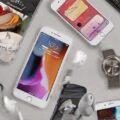In the age of technology-driven health, wearable devices have surged in popularity. From tracking steps to monitoring sleep, these gadgets promise to revolutionize our approach to personal wellness. But are they truly worth the hype? I tested four popular health wearables to find out.
1. Fitbit Charge 5
The Fitbit Charge 5 is one of the most well-known fitness trackers on the market. It offers a plethora of features including heart rate monitoring, sleep tracking, and even stress management tools.
- Pros: Comprehensive health tracking, user-friendly app, long battery life
- Cons: Expensive, requires premium subscription for full features
After using the Fitbit Charge 5 for a few weeks, I found its health insights to be incredibly valuable. The stress management tool, which measures electrodermal activity, was particularly insightful.
2. Apple Watch Series 7
The Apple Watch Series 7 is not just a fitness tracker; it’s a full-fledged smartwatch. It seamlessly integrates with other Apple products and boasts features like ECG, blood oxygen monitoring, and a comprehensive fitness app.
- Pros: Advanced health metrics, seamless integration with Apple ecosystem, stylish design
- Cons: High price point, limited battery life
My experience with the Apple Watch Series 7 was overwhelmingly positive. Its ability to track a wide range of health metrics made it a standout, though the battery life left something to be desired.
3. Oura Ring
The Oura Ring is a unique health wearable that fits on your finger rather than your wrist. It focuses on sleep tracking, daily activity, and overall wellness.
- Pros: Discreet design, excellent sleep tracking, long battery life
- Cons: Limited activity tracking, high cost
I was particularly impressed with the Oura Ring’s sleep tracking capabilities. It provided detailed insights into my sleep cycles, helping me make adjustments for better rest.
4. Garmin Venu 2
The Garmin Venu 2 is a robust fitness tracker with a focus on sports and outdoor activities. It offers GPS tracking, heart rate monitoring, and a variety of workout modes.
- Pros: Accurate GPS, extensive workout options, good battery life
- Cons: Bulky design, complicated interface
As someone who enjoys outdoor activities, the Garmin Venu 2 was a perfect match. Its GPS tracking was highly accurate, and the variety of workout modes kept me motivated.
Are Health Wearables Worth the Hype?
After testing these four popular health wearables, I can confidently say that they offer valuable insights into personal health and fitness. However, the best choice depends on your individual needs and lifestyle. If you’re looking for a comprehensive health tracker, the Apple Watch Series 7 is a great option. For those focused on sleep, the Oura Ring excels. Ultimately, the decision comes down to which features you prioritize and your budget.
FAQ
1. Are health wearables accurate?
Most health wearables offer a high degree of accuracy for basic metrics like steps and heart rate. However, their accuracy can vary for more advanced metrics. It’s always a good idea to cross-reference with other health tools or consult with a healthcare professional.
2. Do I need to subscribe to premium services to get the most out of my wearable?
Some wearables, like the Fitbit Charge 5, offer additional insights and features through premium subscriptions. While basic metrics are usually available for free, premium services can provide more comprehensive data and personalized recommendations.
3. How often do I need to charge my health wearable?
Battery life varies by device. For instance, the Fitbit Charge 5 and the Garmin Venu 2 offer longer battery life, while the Apple Watch Series 7 may require daily charging. The Oura Ring also has impressive battery life, lasting up to a week on a single charge.
4. Can health wearables replace regular health check-ups?
Health wearables are excellent for tracking daily activity and providing insights into your health. However, they should not replace regular health check-ups with a medical professional. They can be a useful tool for monitoring health trends and encouraging a healthy lifestyle.
5. Are health wearables easy to use?
Most modern health wearables are designed to be user-friendly with intuitive interfaces and companion apps. However, the learning curve can vary depending on the complexity of the device and the range of features it offers.









